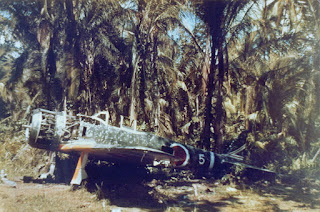A number of quite interesting Nakajima Ki-43 "Hayabusa" photos were offered on ebay this week but they went too high for my badget.
The first photo features a "Hayabusa" belonging to the 3rd Chutai of the 33 Sentai, most probably in Hollandia, New Guinea.
Top green but note the unpainted canopy. It could have a hidden-by-the-tarp number on the fuselage between the hinomaru and the tail.
Voytek Kubacki noticed that it's the same aircraft in the photos below.
The second photo, from a different set, features in the foreground another 3rd Chutai, 33 Sentai "Hayabusa" with the number "2" painted on the fuselage.
Of particular interest is the other "Hayabusa" in the background. Arawasi believes it belonged to the commander of the 3rd Chutai of the 59th Sentai, as indicated by the three yellow fuselage bands and the yellow tail marking. Since this photo was also taken in New Guinea, the unit had two (three) commanders during its time there: 1. Capt Mizoguchi Yuji who was shot down over Tsili Tsili airfield in August 1943 and bailed with his parachute. He was temporarily replaced by Lt Atarashi Tadanobu until 2. Capt Kobayashi Kenjiro took over command of the 3rd Chutai, from November 1943 until December 1944, during the time the unit fought in New Guinea.
Quite unlikely that Mizoguchi's plane survived the crash and was brought by U.S. troops to an airfield, so the only other possibility is that it belonged to Kobayashi.
The chutai of the 59 had the unit tail marking painted in white for the 1st, red for the 2nd and yellow for the 3rd.
Voytek Kubacki noticed that in the Australia War Memorial, there is another photo of the same scrapyard with the same aircraft from a different angle. Notice the 248 Sentai "Hayabusa" on the left.
In this case the fuselage number looks more like an "8" but in the closeup of the photo further above looks to us more like a "2". Could be an "8" though.
Note Kobayashi's fighter in the background.













9 comments:
Great pictures George. Thanks for the notes.
Super!
Superb set of pictures! Too bad you couldn’t get your hands on them. I particularly enjoyed the article on the 59th Hiko Sentai in Arawasi Magazine #13.
Looking at the second photo, I think the wing in the foreground and the rear fuselage and empennage on the right side belong to a late production Hayabusa of 248th Hiko Sentai. The camouflage pattern and damage of said airframe is identical to the one pictured in the fifth photo, clearly showing the rearward facing exhaust stack.
Great photos. I thing the first photo is of number 5 (see the well known colour photo of number 5 from 33 Sentai). I have posted up photos of number 5 on your Facebook post.
Your photo shows how glossy the paint was (or maybe there was a recent rain shower?) and how the paint was applied (larger splotches using a brush) compared to the front portion of the fuselage)
Great pictures and pretty interesting. I have a couple of things to point out about the camouflage - int he first picture it seems the a/c has a two tones spots camouflage that here and there let see the natural metal underneath not due to paint chipping.
In the second picture also the a/c in the foreground seems to sport a two-tones camouflage- this time - with clear and widespread signs of paint chipping...
Huh; I've never before seen the wing ID band "bent" like that, to follow the leading edge. Thanks for that shot.
Harold - check our article on this blog for this subject:
https://arawasi-wildeagles.blogspot.com/2014/03/model-commentary-2a.html
Thanks George! Must have missed that entry, 8 years ago.
Absolutely fascinating photos and equally amazing research !
I wonder how all of these rare photographs suddenly appeared and what others may be yet to come.
Post a Comment